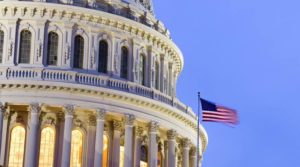
- Details
- By Levi Rickert
Direct payments to individuals is not included in this Act
WASHINGTON — To help ease the strain on American families during the COVID-19 pandemic, Congress sent the Families First Coronavirus Response Act to the White House for President Donald Trump’s signature late Wednesday, who signed it into law.
Key components of the Act guarantee free coronavirus testing, establishes paid leave, enhances Unemployment Insurance, expands food security initiatives and increases federal Medicaid funding.
The act allocates $64 million to the Indian Health Service to cover the costs of COVID-19 diagnostic testing for American Indians receiving care through IHS or urban Indian health organizations. The Act ensures coverage of testing for COVID-19 at no cost sharing for Indians receiving contract health services. Additionally, the Act provides nutrition services for older Native Americans. A summary can be found here.
This Act does not provide direct relief to individual Americans.
Direct relief for individual Americans is expected to be at the core of new legislation Congress began discussing today. The next relief package is expected to surpass $1 trillion dollars and aims at stabilizing the economy, which has experienced a significant downturn as businesses have been shut down or seen dramatic drops in spending.
National American Indian organizations, such as the National Congress of American Indians (NCAI), Native American Finance Officers Association (NAFOA), National Indian Gaming Association (NIGA), National Indian Health Board, among others, are collaboratively advocating on Capitol Hill to ensure American Indian priorities are included in the legislation. NCAI, in particular, says important programs needed in Indian Country are unfunded on an on-going basis.
Included in the requests are the $18 billion the NIGA is seeking to provide relief to closed-down Indian gaming facilities. Nationwide, Indian gaming provides jobs to some 700,000 individuals and ranks 14th nationwide in its contribution to the labor force.
“We cannot ignore the elevated risks faced by Indian Country from this virus,“ said NCAI CEO Kevin Allis. “The federal government’s chronic underfunding of its treaty and trust responsibilities to American Indians and Alaska Natives must end – lives are at risk.”
Congress is expected to pass several more phases of legislation over the coming weeks and months.
More Stories Like This
Native News Weekly (August 25, 2024): D.C. BriefsNavajo Nation Mourns the Passing of Former Vice President Rex Lee Jim
Deb Haaland Earns Endorsement From Communications Workers of America Local 7076
University Soccer Standout Leads by Example
Two Native Americans Named to Democratic Congressional Campaign Committee's“Red to Blue” Program
Help us defend tribal sovereignty.
At Native News Online, our mission is rooted in telling the stories that strengthen sovereignty and uplift Indigenous voices — not just at year’s end, but every single day.
Because of your generosity last year, we were able to keep our reporters on the ground in tribal communities, at national gatherings and in the halls of Congress — covering the issues that matter most to Indian Country: sovereignty, culture, education, health and economic opportunity.
That support sustained us through a tough year in 2025. Now, as we look to the year ahead, we need your help right now to ensure warrior journalism remains strong — reporting that defends tribal sovereignty, amplifies Native truth, and holds power accountable.
 The stakes couldn't be higher. Your support keeps Native voices heard, Native stories told and Native sovereignty defended.
The stakes couldn't be higher. Your support keeps Native voices heard, Native stories told and Native sovereignty defended.
Stand with Warrior Journalism today.
Levi Rickert (Potawatomi), Editor & Publisher

